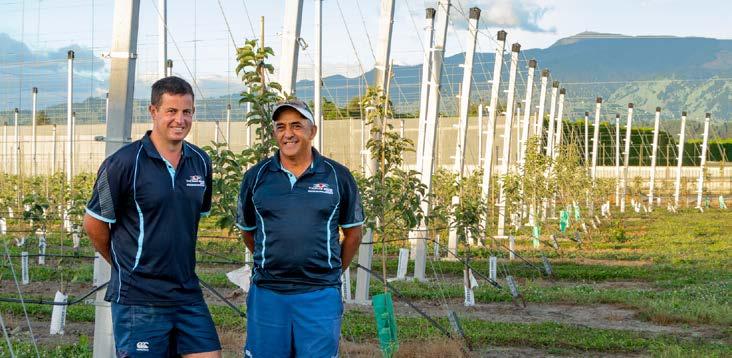
8 minute read
Nelson-Tasman photo competition

2
Budding photographers were quick to enter the Grow NZ Women and Go Horticulture inaugural ‘Fun Sun Grow’ photo competition.
By Anne Hardie
The aim was to showcase the Nelson-Tasman horticulture scene and add a touch of cheer to a year disrupted by Covid-19.
Go Horticulture’s careers progression manager for the region, Robyn Patterson, says it did just that, with entries flowing in of bees, flowers, orchard work and even a prickly hedgehog bundle. “We were acknowledging it had been a tough year for people and we wanted to cheer people up and do something positive in the community. We’re horticulture groups, so we had a horticulture theme and we wanted to showcase the industry. “People got behind the competition and we got some good photos from it,” she says. “I think it inspired people to open their eyes.” Entries had to be from amateur photographers and had to include a living thing with a heartbeat. It was split into four categories and sponsors provided substantial prizes for the winner. The category for school students with a prize of $250, was won by Charlie Robinson-Burrell. The community category with a prize of $500 went to Tash Berridge. The category for entrants working in the horticulture industry was won by Monique Murphy, who received $500. And the prize for the overall winning photo was awarded to Erica Henare who received $1,000.

3 4

1 Overall winning photo by Erica Henare, 2 The winning school student photo by Charlie Robinson-Burrell, 3 The winning industry photo by Monique Murphy, 4 The winning community photo by Tash Berridge
The photos were put on the Grow NZ Women’s Facebook page and voting was judged by the most likes. The competition was advertised via multiple social media networks and Horticulture New Zealand, plus the polytech, schools and even the Nelson Regional Development Agency. Organisers also ‘blitzed’ the region with posters to entice people to get out their camera or phone and capture an image. Robyn says the success of the competition has prompted the Nelson-Tasman groups to plan another next year, with Horticulture New Zealand planning to hold a national competition. The photos can be viewed on the Grow NZ Women Facebook page, https://www.facebook.com/ grownzwomen/.

Integrated anti-hail cover Fully engineered structures Built to your requirements Tried & proven for 50 years
From left: Mark Thomas and Bevan Thompson - Pipfruit Managers at Thomas Bros Ltd 0800 222 312 info@hortivate.co.nz hortivate.co.nz

”Hortivate structures are easy to install, cost effective and a solid product. The ease of having the complete system arrive on-site at one time simplifies the project and we enjoyed dealing with one supplier at competitive rates. The componentry of the structure is very user friendly, allowing you to use a larger range of experienced staff to install. Hortivate offered great support and we look forward to working with them on future projects.” - Mark Thomas
Food Act 2014 – Renewals due in 2021
It has now been two years since the deadline for horticulture businesses to become registered under the Food Act 2014, so grower registrations are now due for renewal. (Registration is due every two years.)
By Damien Farrelly : Food Safety Manager, HortNZ
In 2019, more than 4,000 growers were registered under the Food Act 2014 as a result of recognition of our Good Agricultural Practice (GAP) schemes (NZGAP and GLOBALG.A.P.)
As growers have taken advantage of an effective batch registration process via industry groups (NZGAP, Zespri, Avoco, Seeka, and New Zealand Apple and Pears), the costs and complexities of Food Act registration have been minimised. Using this same process, the renewal of Food Act registrations will be seamless for growers who are utilising this industry service. Growers wishing to use this service, or unsure whether to do so, should contact their relevant industry group (NZGAP, Zespri, Avoco, Seeka, or New Zealand Apple and Pears). Packhouses, transporters, storage providers, and wholesalers can also register via NZGAP.
A grower’s Food Act renewal date is based on when the grower was first registered with the Ministry for Primary Industries (MPI) rather than the anniversary date of the grower’s GAP certificate, therefore most Food Act registrations will expire between February and April this year. Growers should soon expect to receive communications from the respective GAP industry group who originally registered them for the Food Act (see above). Once the renewal has been confirmed by the industry group and subsequently processed by MPI, growers will receive an updated Food Act registration certificate from MPI. This certificate will most likely be received at the beginning of the month that the existing Food Act registration is due to expire. Overall, batch registration has saved the horticulture industry a lot of administration and confusion, plus over $1 million in direct registration costs to date, and savings will almost double this year once renewals have been processed. This is compared to the cost if each business had registered individually via the local council or MPI, and it highlights the value that GAP schemes continue to deliver for growers. If a horticulture business (grower, packer, storage provider, transporter or wholesaler) is now commercially operating without registration, they are in breach of the Food Act 2014 and could be subject to enforcement action. Although the Ministry for Primary Industries will use a range of interventions, if businesses are found to be unregistered, large fines (up to $200,000 for companies and $50,000 for individuals) could be applied. Markets and customers may also refuse to accept goods or use services of businesses not registered under the Food Act, in addition to considering their compliance with existing requirements for GAP certification. By recognising the GAP schemes, standards, and audit systems that have been in place for over 20 years, growers are now demonstrating compliance with the Food Act 2014 and can continue to provide safe and suitable fruit and vegetables for New Zealanders and our many export markets.
This fact sheet is the first of a series providing you with information on the new Food Act and what it will mean for your business. To view sector fact sheets and for more information go to
www.mpi.govt.nz
THE KEY CHANGES » The central feature of the new Act is a sliding scale where businesses that are higher risk from a food safety point of view will operate under more stringent food safety requirements and checks than lower risk food businesses. » The new law recognises that each business is different and is a positive step forward from the old Food Act 1981 and its onesize-fits-all approach to food safety. This means that a ‘corner’ dairy operator who reheats meat pies won’t be treated in the same way as the meat pie manufacturer. Different measures may be applied – Food Control Plans (FCP) for higher-risk activities, and National Programmes for lower risk (see overleaf for details). » The Act only covers food that is produced and sold or traded commercially. FOOD ACT 2014 The facts
WHAT WILL THE FOOD ACT MEAN FOR ME? If you make and sell food – » If you are producing higher risk foods like meat, dairy products or ready to eat meals for sale you will operate under a FCP (or continue to operate with a Risk Management Programme if you are under the Animal Products Act 1999). » Many businesses selling higher risk foods already have Food Safety Programmes in place. Where a business operates a food safety programme that is registered with MPI or their local council, the programme will be deemed to be a FCP under the Food Act 2014. After commencement (no later than 1 March 2016), and by the end of the transition period for their sector, the business will need to have met the requirements of the Food Act 2014. » If you make higher risk foods under the Food Hygiene Regulations, you will need to operate with a Food Control Plan. There will be a period of transition after the new Act commences for you to prepare to do this. MPI will be developing a range of templates, for example, for retailers such as butchers, bakers, delicatessens and fishmongers to tailor to suit their business. A template is currently available for the food service sector. If you make and sell lower risk food – » If you are producing lower risk foods like bread-only products, jams, pickles or confectionery for sale you will operate under one of three levels of National Programmes. MPI is developing guidance for businesses to meet regulatory requirements for National Programmes. If you sell fruit and vegetables – » If you sell your own fruit and vegetables directly to the consumer, for example, at roadside stalls or farmers’ markets, all you have to do is continue to sell safe food. Free food safety guidance will be available. » If you sell your own fruit and vegetables to another outlet, such as a supermarket, store or someone else’s stall at a farmers’ market, you’ll need to operate under National Programme Level 1. Ensuring the safety of the food we sell, whether it’s produced here, imported, or exported, is essential as a nation. Everyone working in the food industry has responsibilities to make sure that the food we buy is safe and suitable to eat, whether that involves growing and harvesting crops, the food manufacturing process, or preparation and sale of food at shops, cafés or restaurants. The new Food Act gives food businesses the tools to manage food safety themselves, based on the level of risk associated with the kinds of food activity undertaken and in a way that suits their business. The new law allows businesses to be more adaptable to future changes in technology, overseas market access requirements, and consumer demands. The provisions in the new Food Act for recalling food will be implemented immediately. Other parts of the Act will come into effect no later than 1 March 2016.
For more information on the Food Act 2014 please contact your GAP provider, industry body, MPI, or check the MPI www.mpi.govt.nz/foodact, NTWG www.hortnz. co.nz, or NZGAP websites www.nzgap.co.nz










